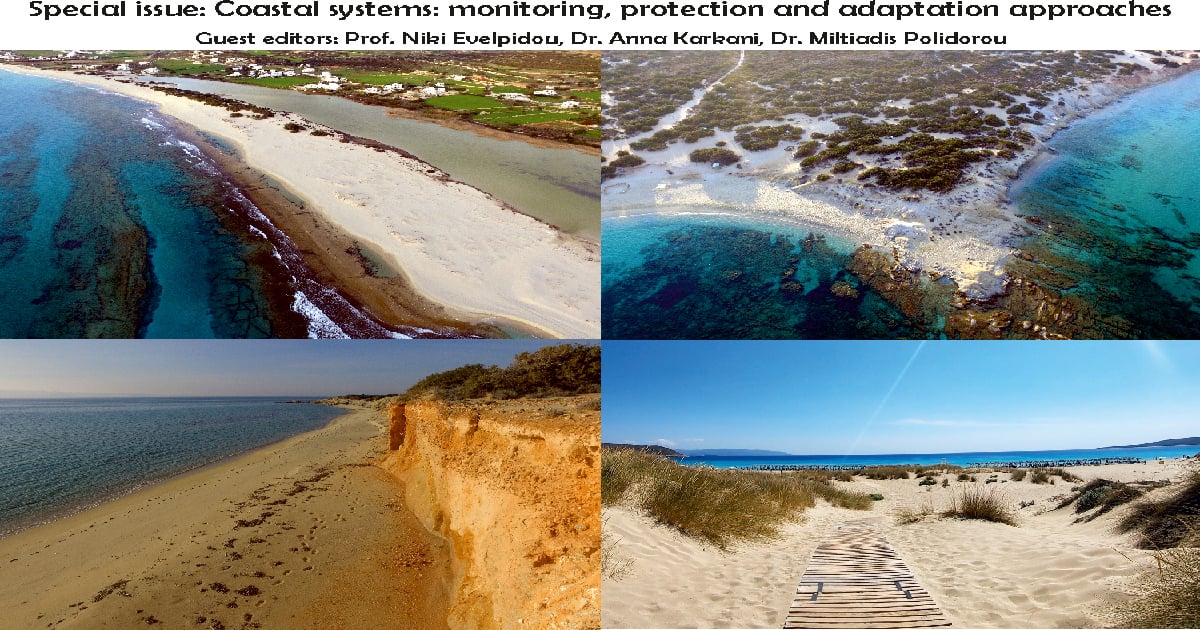Coastal Systems: Monitoring, Protection and Adaptation Approaches
A special issue of Journal of Marine Science and Engineering (ISSN 2077-1312). This special issue belongs to the section "Coastal Engineering".
Deadline for manuscript submissions: closed (31 August 2023) | Viewed by 46723

Special Issue Editors
Interests: geomorphology; coastal geomorphology; sea-level changes; palaeogeography; geoarchaeology; study and modelling of natural hazards
Special Issues, Collections and Topics in MDPI journals
Interests: geomorphology; natural hazards; GIS; sea level changes; palaeogeography
Special Issues, Collections and Topics in MDPI journals
Interests: geomorphology; coastal geomorphology; sea level changes; palaeogeographic reconstructions; natural hazards; geoarchaeology
Special Issues, Collections and Topics in MDPI journals
Special Issue Information
Dear Colleagues,
Coasts are dynamic and fast-changing environments. They are areas of unique natural importance, providing important natural habitats for flora and fauna and home to more than 40% of the global human population. Because of their rich resources, they are more densely populated than the hinterland and exhibit higher rates of population growth and urbanisation. Over millennia, changes in relative sea level, geomorphological processes and extreme events such as storms, hurricanes and tsunamis have shaped and changed the earth’s coastlines. Although coastal areas are naturally dynamic, and climate change is considered responsible for many impacts over the long term, a number of other factors, such as human interventions, sediment supply from fluvial systems, etc., also contribute significantly. Therefore, a systems approach is necessary to understand the adaptation challenge. This Special Issue invites researchers and scientists involved in related studies to come forward with their research and present their findings. Topics of interest include but are not limited to the following areas:
- Coastal erosion and coastal hazards in general;
- Human impacts on the coastal zone;
- Sea-level rise impacts;
- Protection measures on the coastal zone;
- Coastal-zone monitoring techniques;
- Innovative adaptation approaches;
- Communication tools for stakeholders and the general public;
- Climate change and coastal zone.
Prof. Dr. Niki Evelpidou
Dr. Anna Karkani
Dr. Miltiadis Polidorou
Guest Editors
Manuscript Submission Information
Manuscripts should be submitted online at www.mdpi.com by registering and logging in to this website. Once you are registered, click here to go to the submission form. Manuscripts can be submitted until the deadline. All submissions that pass pre-check are peer-reviewed. Accepted papers will be published continuously in the journal (as soon as accepted) and will be listed together on the special issue website. Research articles, review articles as well as short communications are invited. For planned papers, a title and short abstract (about 100 words) can be sent to the Editorial Office for announcement on this website.
Submitted manuscripts should not have been published previously, nor be under consideration for publication elsewhere (except conference proceedings papers). All manuscripts are thoroughly refereed through a single-blind peer-review process. A guide for authors and other relevant information for submission of manuscripts is available on the Instructions for Authors page. Journal of Marine Science and Engineering is an international peer-reviewed open access monthly journal published by MDPI.
Please visit the Instructions for Authors page before submitting a manuscript. The Article Processing Charge (APC) for publication in this open access journal is 2600 CHF (Swiss Francs). Submitted papers should be well formatted and use good English. Authors may use MDPI's English editing service prior to publication or during author revisions.
Keywords
- Coastal geomorphology
- Coastal hazards
- Coastal erosion
- Sea level rise
- Nature based solutions
- Integrated coastal management
- Awareness raising
Benefits of Publishing in a Special Issue
- Ease of navigation: Grouping papers by topic helps scholars navigate broad scope journals more efficiently.
- Greater discoverability: Special Issues support the reach and impact of scientific research. Articles in Special Issues are more discoverable and cited more frequently.
- Expansion of research network: Special Issues facilitate connections among authors, fostering scientific collaborations.
- External promotion: Articles in Special Issues are often promoted through the journal's social media, increasing their visibility.
- Reprint: MDPI Books provides the opportunity to republish successful Special Issues in book format, both online and in print.
Further information on MDPI's Special Issue policies can be found here.







